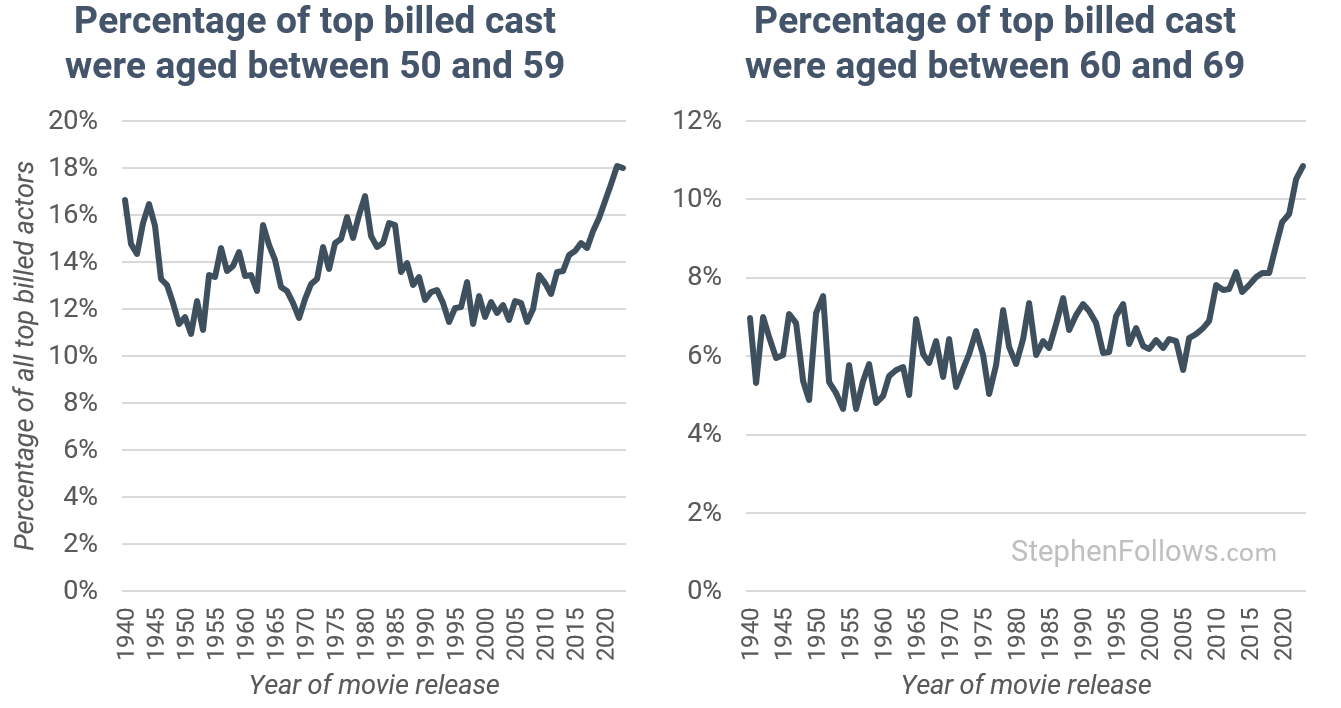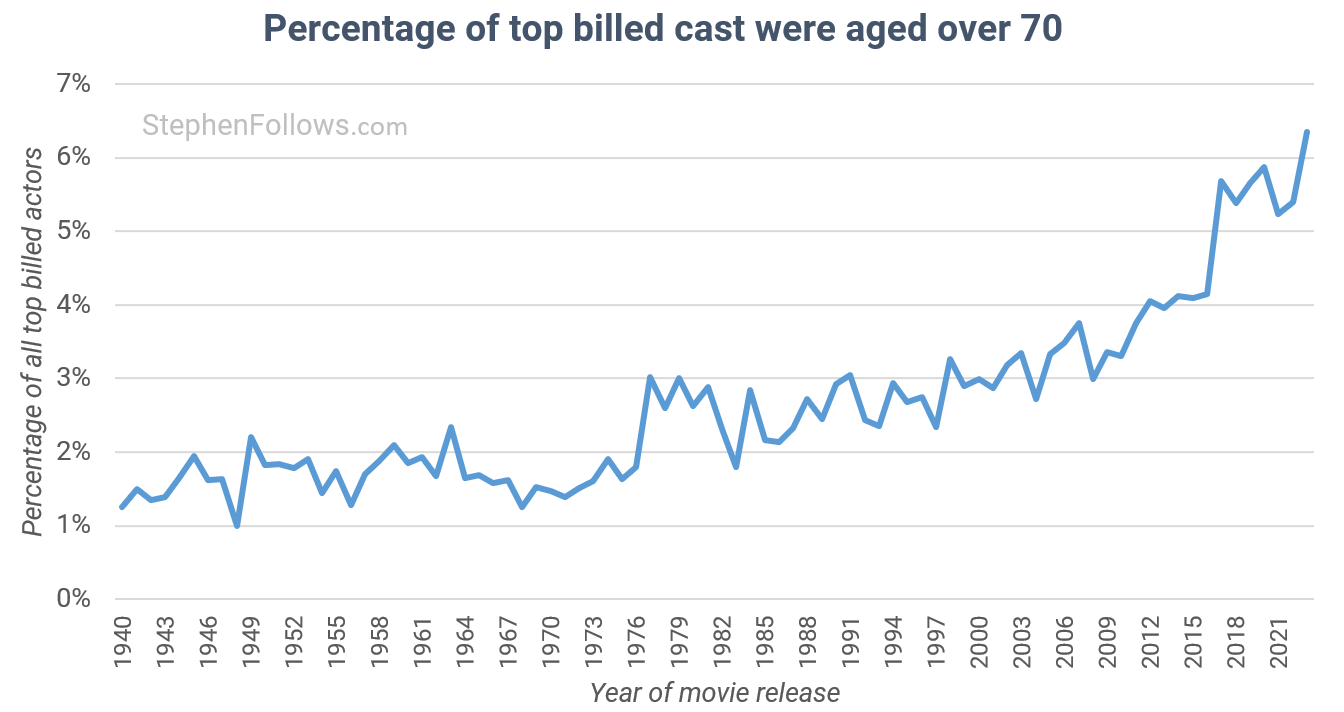Why are actors getting older?
During the 20th century, the average age of leading movie actors was fairly static. But in the past few decades, it's risen considerably - why?
In writing this blog and my work for Guinness World Records, I sometimes stumble on findings that feel like they reveal something big about our culture.
This happened recently with the discovery that sex on screen has fallen by 40% since 2000, while representations of drugs, violence, and swearing have not similarly diminished.
Today's journey began when I was investigating the theory that action movie stars are getting older. I did indeed discover that the average age of actors leading action movies has been increasing, but I also found that same trend in all genres.
Let's start at the beginning to see what we can uncover about this intriguing finding.
The average age of actors is rising
There is more information about data and methodology at the bottom of this article. For now, it’s enough to know that we’re talking about the age of the top six billed actors in the year the movie was released.
Across all 24,295 cast credits I studied, the average age of the actors was 39.97 (I gave you that to two decimal points to avoid the neatness of just saying 40 - it’s Everest’s height all over again).
However, this single number obscures a multitude of interesting details.
During the 1900s, the annual average age of actors stayed solidly between 38.2 (in 1941) and 40.5 (in 1977). But after around 2005, the average began to rise consistently. It stood at 38.7 in 2005 but has grown to 44.7 by 2023.
In all genres
The strongest correlation between time and the age of actors can be found among action movies and westerns.
The weakest link over that same period is seen in horror movies, partly because it was actually falling in the last few decades of the 20th century. But even among horror movies, the last few decades have experienced the same steady rise.
Does gender play a role?
My first thought was that this might be linked to changes in the demographics of leading actors, especially around gender.
So I researched the gender of these leading actors (more notes on that at the end of the piece). The chart below reveals that our recent rise in average age is present in actors of both major genders.
As a quick aside, it is interesting to note how the age gap between actors has stayed fairly consistent over such a long period of time. Since the 1980s, the average male lead has been six years older than the average female lead.
So if it’s not connected to gender… what else could it be?
‘Big budgets buy experience’ / ‘Oldies hire oldies’
Not all movies are funded equally, and over the past few decades, we have seen a quadrupling in the number of movies produced. Ubiquitous cameras, cheaper post-production, free online education, increasing distribution channels, and rising global wealth have all played their part in this production boom.
So I investigated whether this could explain our ageing performers.
In fact, it’s probably a drag on the trend!
I took a smaller sample of 29,212 movies made between 2000 and 2023 for which I could find budget figures and looked at how they interacted with the age of the leads.
I discovered that as budgets rise, so too does the average age of actors.
While the total number of movies produced has increased significantly since 2000, there has been next to no rise in the number of the biggest-budgeted films (partly due to studio fears but also because the marketplace can’t support more than about 100 “major” movies a year before they start to cannibalise their own audiences).
So it’s not the case that the boom in independent movies led to an increase in older roles / actors.
Age before beauty
Before we go, I wanted to share a little more about what the trend actually is, to aid everyone’s suggestions.
Put simply, the average age of actors is rising because more leading roles are going to older actors.
Acting has always favoured the young. Across all movies over the whole period I studied, just over half of leading actors were in their 30s and 40s.
But this has been changing.
Below we can see the percentage of top-billed actors who were under 18 and those in their 20s. Both subsets display a drop in representation.
The comparable charts for people in “mid-life” show a fairly static trend.
Whereas people in the older brackets are on the rise.
With the biggest rise being found in the oldest bracket.
So there you have it…
… a clear trend without a satisfying cause.
Please do add your ideas, theories, and thoughts in the comments. I shall re-crunch the data on any interesting theories.
Notes
Today’s research looked at the top six billed cast members (for which I use the gender-neutral word “actors”) for all movies released between 1940 and 2023. I then sought out dates of birth and death for all the actors. This allowed me to determine the age of each actor in the year the movie was initially released. (So the age they were when the movie was shot is likely to be 12 to 18 months under the average ages shown in the charts above). That's 24,295 cast credits.
Data came from Wikipedia, Wikidata, The Numbers / OpusData, IMDb, OMDb, and a variety of other public sources.
I used biographies to determine gender. This uses a binary conception of gender as sadly this is how the film industry has regarded people until extremely recently.
Get the Data
Paid subscribers of this blog can contact me for the data in the charts above.














Doesn't this mirror the audience? I noticed this trend about a year ago when I went to the cinema without my kids for the first time in too long. I was struck that with only one exception all the trailers weren't just starring older actors, they were for stories about being old. The lights came up and I was the youngest middle-aged person in the room...
My 'guesstimate'? 1 - It's gotten cheaper to make movies so more people are making more movies. 2 - Absent indies, those who make films for commercial release and/or big time streaming face more total competition from the extra movies being made and it's harder to 'stand out' when there is more total product entering the marketplace. 3 - Faced with increased total competition, some film makers are relying on 'proven' stars who are getting older. Hence the average age of leading movie actors tends to increase.